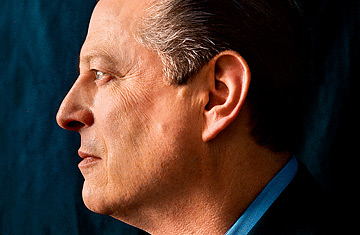
Al Gore
(5 of 5)
"I have enjoyed the luxury of being able to focus single-mindedly on this issue," says Gore, back on the patio at his Nashville home. "But I am under no illusions that any position has as much ability to influence change as the presidency does. If the President made climate change the organizing principle, the filter through which everything else had to flow, then that could really make a huge difference."
What would President Gore do? Well, on Capitol Hill in March, Citizen Gore offered his ideas. He advocates an immediate freeze on CO2 emissions and a campaign of sharp reductions--90% by 2050. To get there, he would eliminate the payroll tax and replace it with a carbon tax, so the cost of pollution is finally priced into the market. "I understand this is considered politically impossible," he told the House Energy and Commerce Committee. "But part of our task is to expand the limits of what's possible." He would adopt a cap-and-trade program that would allow U.S. industry to meet reduction targets in part by trading pollution credits. Critics often dismiss carbon offsets as the green equivalent of religious indulgences, but in fact they stimulate the market--moving entrepreneurs to find dirty plants, clean them up and sell the CO2 reductions. Gore also wants a moratorium on new coal-fired power plants that don't capture and store their carbon emissions and much higher fuel-economy standards for cars. After Gore presented these views on Capitol Hill, critics assailed them as costly, unworkable economy cripplers. His reply: in a few years, when the crisis worsens, these proposals "will seem so minor compared to the things people will be demanding then." And, of course, he's not running for anything these days. He's in the vision business now.
I ask Gore if he regrets not having made climate change the organizing principle of his cautious 2000 campaign. Doing so might not have won many votes by itself, but it might have helped free him from the consultants, unleashing a more authentic Gore--and that could have made all the difference. "There's a tree-falls-in-the-forest factor here," he says. "Because the many speeches that I made about this were not really reported. More than half the articles written about global warming that year said it might not even be real. But I take responsibility for not having the skills needed to break through the clutter. At least not then. Perhaps I still don't."
But what if he does? What if he could take who he is now, all that he's learned, and carry it back into the maelstrom? Could he stay as he is or would he revert? What if he launched a new kind of campaign: no handlers, just the liberated Gore talking about what really matters to him? Would he seem too squishy? These days he improvises, giving freer rein to matters of the heart and spirit than he ever could as a candidate. He draws from a number of faiths, from philosophy and self-help and poetry and from Gandhi's concept of truth force, the idea that people have an innate ability to recognize the most powerful truths. He often cites an African proverb that says, "If you wish to go quickly, go alone. If you wish to go far, go together." Then he builds on it. "We have to go far, quickly," he said in April at the Tribeca Film Festival, where he was introducing a series of environmental films that will be shown at Live Earth. "We have to make it through an uncharted region, to the outer boundaries of what's known, beyond the limits of what we imagine is doable." Then he recited a famous line from the poet Antonio Machado: "Pathwalker, there is no path. You must make the path as you walk." I once heard him get tangled in that line during the 2000 campaign, but this time, he wasn't trying too hard. "We must find a path that we create together, quickly," he said. "With truth force. To seize the opportunity that lies before us." His words were simple, direct and powerful. One clue to how he found that power lies at the end of the poem, in a line Gore doesn't recite, as the poet reveals his desire "to be what I have never been ... a man all alone, walking with no road, with no mirror."
Gore is not carrying a mirror. He's not selling himself; he's selling a cause, a journey. There are no consultants fussing at him, telling him how to be himself. "There's no question I'm freed up," he says. "I don't want to suggest that it's impossible to be free and authentic within the political process, but it's obviously harder. Another person might be better at it than I was. And it's also true that the process is changing and that it may become freer in time. Obama is rising because he is talking about politics in a way that feels fresh to people ... But anyway, I came through all of that"--he waves a hand that seems to encompass everything, the advisers pecking at him, the attacks in the media, his own mistakes, the unspeakable Florida debacle--"and I guess I changed. And now it is easier for me to just let it fly. ' W ' " What would this Gore be like as a candidate? This Gore is just not all that tempted to find out.
